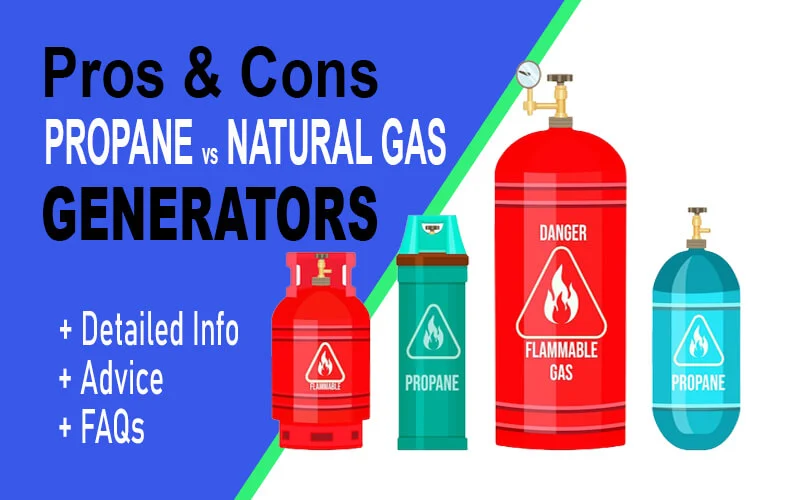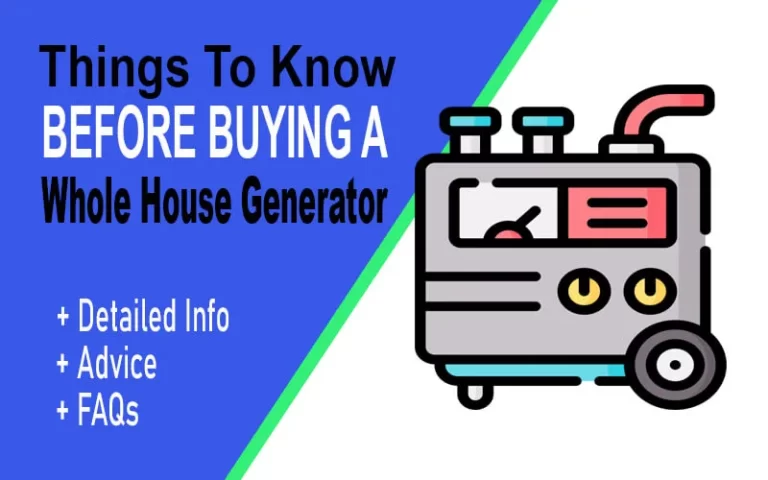Propane vs Natural Gas Generators [+Difference |+Pros Cons]
Which one is better, propane vs natural gas generators? The generators are the engines that power your home. They turn the electricity that lights up your house and heats your water into motion. If something goes wrong with one of your generators, you may be unable to power your home or heat your water.
Mechanical energy can be converted into electrical energy by a generator. This conversion is typically done by using a diesel engine or gas engine to turn a generator’s shaft, which in turn rotates an electromagnetic coil or alternator. The electrical energy created can be utilized to run things like lights, apparatuses, and other gadgets.
Although the principle mechanism operating the generator is the same, the choice of fuel can add a lot of dimensions to your use. Particularly comparing propane and natural gas – the two main types of generators – introduces factors such as cost, shelf life, and environmental impact whereas making a purchase also calls for some consideration for comparison of their sizes, safety, and reliability relative to your needs.
propane vs natural gas generators?
| What is A Propane Generator? | What is A Natural Gas Generator? |
|---|---|
| Utilizing a propane generator to generate electricity allows you to transform the motorized power created by burning gas into energy. This type of generator is used to power tools, appliances, and other equipment in remote or difficult-to-reach locations. Propane is a colourless, odourless, flammable gas that is derived from petroleum. It is frequently used as a fuel for campfires, grills, and lanterns. When used in a generator, propane burns cleanly and efficiently, making it a popular choice for powering homes and businesses in the event of a power outage. | The natural gas generator is a device that burns natural gas to generate energy. The most accessible energy source on Earth is natural gas, a fossil fuel. Power generating, heating, and cooling are just a few of the various uses for natural gas generators. Natural gas generators work by burning natural gas in a combustion chamber. The heat from the combustion drives a turbine, which generates electricity. Natural gas generators are very efficient and have a low environmental impact. Natural gas generators are an essential part of the world’s energy mix and will continue to play a vital role in meeting our energy needs in the future. |
What Are The Pros And Cons Of Propane Generators?
Pros Of Propane Generators:
When the power goes out, a propane generator can be a lifesaver. Be that as it may, in any event, when the power is on, propane generators enjoy numerous upper hands over different sorts of generators.
Here are only a couple of the pros of propane generators:
1. There are no interruptions: Propane is a clean-burning fuel, so there are no emissions to interrupt your power supply.
2. Keeps the environment clean: Propane generators produce far fewer emissions than gasoline or diesel generators, making them much friendlier to the environment.
3. Lower operating costs: Propane is less expensive than diesel, so you’ll save money on fuel costs with a propane generator.
4. Great for people with allergies: Because they produce fewer emissions, propane generators are ideal for people with respiratory problems or allergies.
5. Reliable: Propane generators are truly dependable and will keep your lights on during a blackout.
6. Versatile: They are likewise extremely flexible and can be utilized to drive a wide assortment of gadgets.
Cons of Propane Generator:
In addition to propane generators’ many advantages, there are also a few disadvantages to consider. Propane generators have a number of cons that make them less efficient than other generators.
1. Propane generators are not as efficient as other fuel options. One of the main reasons for this is that propane is a gas, and gas generators have to work harder to convert the fuel into energy. Additionally, propane is a less dense fuel than gasoline or diesel, so it takes more propane to generate the same amount of power.
2. Another downside is that they are typically more expensive than gasoline generators.
3. Repairs can be more complex and costly since propane generators often have more intricate designs.
4. Another potential issue is that the engine may have a shorter life expectancy than a gasoline generator.
By and large, a propane generator should gauge its upsides and downsides prior to making a buy.
What Are The Pros And Cons Of Natural Gas Generators?
Pros Of Natural Gas Generators:
If you are considering a natural gas generator for your home or business, there are several pros to take into account.
1. Fuel cost is a primary consideration when running a power generator. Natural gas generators have a significant advantage in this area over other types of generators because natural gas costs less than gasoline, diesel, or propane.
2. Another advantage of natural gas generators is that they don’t require on-site fuel storage. This can be a significant benefit if you live in an area with limited space or if you’re worried about the potential for fuel theft.
3. Natural gas generators also tend to produce better air quality than other types of generators. This is because natural gas burns cleaner than other fuels, so there are fewer emissions from a natural gas generator.
4. One of the most significant advantages is that no regularly scheduled fuel maintenance is required. In order to keep other types of generators running correctly, you need to schedule regular maintenance.
5. Another advantage of natural gas generators is that you can avoid flooding, delivery issues, and accessibility issues. If you own another type of generator, you may have to deal with these issues frequently.
6. Another significant advantage of natural gas generators is that they help you avoid fuel spills and the associated cleanup. Because the fuel is stored in a tank, there’s no risk of spillage, and you won’t have to worry about dealing with messy cleanup afterward.
7. Last but not least, natural gas generators tend to be more efficient than other types of generators, thus resulting in lower fuel costs in the long run. All in all, natural gas generators offer a number of significant advantages that make them worth considering for your backup power needs.
Cons of Natural Gas Generator:
As the demand for natural gas generators increases, so do the concerns about their safety.
Here are three of the biggest cons to using natural gas generators:
1. Difficult to find fuel in emergencies: If you live in an area that is prone to power outages, it can be challenging to find natural gas during an emergency. Even if you have a generator that uses natural gas, you may not be able to get the fuel you need to keep it running.
2. Harder to store gasoline: Natural gas is more rigid to store than gasoline, so you may not be able to keep as much on hand. The generator may experience problems if you need to use it for a long period of time.
3. More dangerous to store fuel: Gasoline is highly combustible, so it must be stored carefully.
Which is better: propane generator or a Gas generator?
Assuming there ought to be an event of power outages or various emergencies, generators can be an unprecedented alternate course of action. It is crucial to note, at any rate, that not all generators are made something very similar. Gas generators are more efficient but are less environmentally friendly than propane generators.
Your requirements and needs are the main thing to consider while picking a generator. Choosing a propane generator is the better choice if you are eco-conscious. However, if you prioritize and measure efficiency and power, then a gas generator is the way to go.
Conclusion:
The propane generator vs natural gas generators debate rages on, with both sides having good pros and cons. Concerning which kind of generator you pick, it truly descends to your own inclination. However, one thing is for sure: a generator is a vital piece of equipment to have in any home, business, or office in case of a short circuit.




![Find Out Now! Best RV Generators in 2023 [#2 Is Life-Saving]](https://prohouseideas.com/wp-content/uploads/2022/12/best-rv-generators-768x480.webp)
![Portable Generator Shelters: Build or Buy? [+Guide] 2023](https://prohouseideas.com/wp-content/uploads/2022/09/portable-generator-shelters-768x480.webp)
![Find Out Now! Best Whole House Generators In 2023 [#3 Is Life-Saving]](https://prohouseideas.com/wp-content/uploads/2022/12/best-whole-house-generators-768x480.webp)
